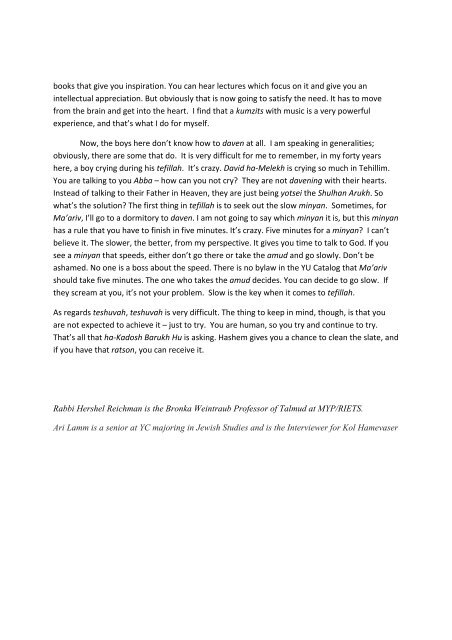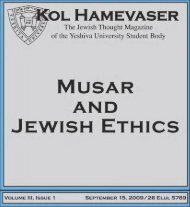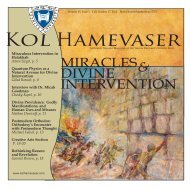here - Kol Hamevaser
here - Kol Hamevaser
here - Kol Hamevaser
Create successful ePaper yourself
Turn your PDF publications into a flip-book with our unique Google optimized e-Paper software.
ooks that give you inspiration. You can hear lectures which focus on it and give you an<br />
intellectual appreciation. But obviously that is now going to satisfy the need. It has to move<br />
from the brain and get into the heart. I find that a kumzits with music is a very powerful<br />
experience, and that’s what I do for myself.<br />
Now, the boys <strong>here</strong> don’t know how to daven at all. I am speaking in generalities;<br />
obviously, t<strong>here</strong> are some that do. It is very difficult for me to remember, in my forty years<br />
<strong>here</strong>, a boy crying during his tefillah. It’s crazy. David ha‐Melekh is crying so much in Tehillim.<br />
You are talking to you Abba – how can you not cry They are not davening with their hearts.<br />
Instead of talking to their Father in Heaven, they are just being yotsei the Shulhan Arukh. So<br />
what’s the solution The first thing in tefillah is to seek out the slow minyan. Sometimes, for<br />
Ma’ariv, I’ll go to a dormitory to daven. I am not going to say which minyan it is, but this minyan<br />
has a rule that you have to finish in five minutes. It’s crazy. Five minutes for a minyan I can’t<br />
believe it. The slower, the better, from my perspective. It gives you time to talk to God. If you<br />
see a minyan that speeds, either don’t go t<strong>here</strong> or take the amud and go slowly. Don’t be<br />
ashamed. No one is a boss about the speed. T<strong>here</strong> is no bylaw in the YU Catalog that Ma’ariv<br />
should take five minutes. The one who takes the amud decides. You can decide to go slow. If<br />
they scream at you, it’s not your problem. Slow is the key when it comes to tefillah.<br />
As regards teshuvah, teshuvah is very difficult. The thing to keep in mind, though, is that you<br />
are not expected to achieve it – just to try. You are human, so you try and continue to try.<br />
That’s all that ha‐Kadosh Barukh Hu is asking. Hashem gives you a chance to clean the slate, and<br />
if you have that ratson, you can receive it.<br />
Rabbi Hershel Reichman is the Bronka Weintraub Professor of Talmud at MYP/RIETS.<br />
Ari Lamm is a senior at YC majoring in Jewish Studies and is the Interviewer for <strong>Kol</strong> <strong>Hamevaser</strong>
















